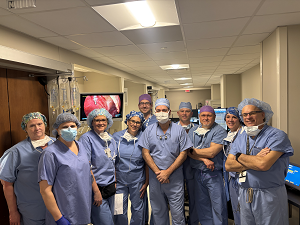Deaf Cancer Patient Support Group
This quarterly in-person group is especially for patients who are deaf or hearing impaired, as well as their caregivers. Support and education are...
The gastrointestinal (GI) tract is a major part of the digestive system. Tumors that form in the walls of the GI tract are called gastrointestinal stromal tumors (GISTs). Though GISTs often indicate cancer, they are not always cancerous (malignant). Some are non-cancerous (benign) and are unlikely to spread in the body.
Certain people are at high risk for GISTs. These include:
GISTs can be smaller than the head of a pencil eraser, making them difficult to detect. They also may not cause any symptoms. However, if you experience any of these symptoms, see a doctor to diagnose your condition:

We recommend GIST treatment based on the size, stage, and location of the tumor. Treatment may include a combination of these options:
We may recommend combined treatments to shrink the size of your tumor and make it resectable – able to be removed with surgery. We also offer minimally invasive procedures for people who have been told they are not good candidates for traditional open surgery.
This quarterly in-person group is especially for patients who are deaf or hearing impaired, as well as their caregivers. Support and education are...
This hybrid support group is for patients with Neurofibromatosis types 1 and 2 and their care partners. Medical experts will present topics and...
This twice monthly group, facilitated by a professional counselor/social worker, offers patients an opportunity to express their feelings and...
Heal through art in the comfort of your home, but with the support of a group and registered art therapist during this monthly virtual art therapy...

DETROIT — Newly published research conducted in Wayne County, Mich. found that non-smokers, particularly women, who lived near textile and...



We use cookies to improve your website experience. By using this site, you agree to our Terms of Use. Read our Internet Privacy Statement to learn what information we collect and how we use it.